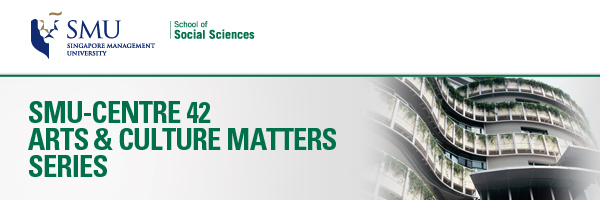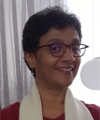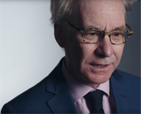The Arts and Culture Matters Series is a platform for robust, lively and collegiate discussion of the issues and challenges related to the arts and cultural landscape. Each discussion will collectively convene members of the arts and creative community including artists, scholars, students, and policy-makers, to explore timely topics that will nurture and advance understanding on the arts and culture, especially in and from the context of Singapore. This series was started in 2017 by the Arts and Culture Management Program, in the School of Social Sciences at the Singapore Management University. For 2018, the series is produced in partnership with Centre 42.

|
This session introduces the connectivity between culture-making and placemaking and the components necessary for these processes to take place. It talks about how culture is an underutilised asset in urban planning and development and why it needs to be seriously considered in planning and policy initiatives that aim for liveability, equitability and viability. Placemaking initiatives are often overtly concerned with physical and economic rejuvenation resulting in the use of well-worn strategies such as adaptive reuse of buildings, niche retail, public art or landscaping. What is often missing is the social dimension of placemaking. This session examines some case studies which illustrate “how” and “why” creative entrepreneurs, professionals and communities can and should be drawn into the placemaking process. It also looks at the role of intermediaries who bring together the various parties and their agendas, and the role of creative professionals in facilitating design and programming that celebrate and cultivate the values of a place by involving communities themselves in creative placemaking. |
| Speaker: | Janet Pillai Cultural Researcher and Consultant |
|
| About the Speaker: |
Janet Pillai served as an Associate Professor at the Department of Performing Arts in University Sains Malaysia until 2013 and founded Arts-ED (2007), a non-profit organisation in Penang which provides place-based culture education for young people.
Pillai is an independent researcher and consultant in the field of cultural sustainability. Her specialisation is in the area of cultural mapping, community-engagement and arts and culture education. Her work entails research and programming community-engaged projects in partnership/ consultation with community, local agencies, artists and professionals. Pillai has authored three books and numerous articles on arts and culture education and sustainability. She also contributes as expert resource person in regional organisations such as UNESCO Bangkok, APCIEU Korea, and GETTY Foundation. |
|
| Chair: | Assistant Professor Hoe Su Fern School of Social Sciences Singapore Management University |
|
| Date: | Saturday, 3 March 2018 | |
| Time: | 4.00 pm - 6.00 pm (Registration starts at 3.45 pm) | |
| Register: | Click here. |
|
In recent years, the “Laboratory” has gained increased popularity both in the humanities and social sciences as well as in the museum field. It stands for a devotion to the openness of knowledge production, to the notion of the experiment, and to reflexivity towards the architectures and apparatuses of knowledge. What is the specific potential of such laboratory spaces for the museum? How do they relate to the ways the larger institutions display art, culture, and science? What are the limitations in an institutional setting that is traditionally geared towards conservation, and therefore by definition somewhat at odds with the notion of the lab? This session will begin with a presentation of some insights from the German context. In particular, the presentation will discuss the Humboldt Forum in Berlin, which is due to open in late 2019 and is currently also the largest and the most contested cultural project in the planning within Germany. The Forum has over time become a discursive knot for debates about colonial provenance of ‘non-European’ collections in European institutions, about city-planning and cultural place-making, as well as about the possibilities of alternative modes of museum representation. This presentation will address two attempts to intervene in the established practice of displaying collections, which are both connected to the larger project: the Humboldt Lab Dahlem (2013-2015), which was an experimental test run for the Forum carried out to explore new ways of engaging with collections and to introduce new formats of display; and the Humboldt Laboratory, which will be the exhibition space of Berlin’s Humboldt University in the future Humboldt Forum. Through a discussion of these examples, this session aspires to contribute to an exchange that may also be of relevance for the Singapore context; and that enables us to develop further on the question about how the “paradoxes of intervention” may be fruitfully engaging for future museum work. This session will conclude with an interactive discussion on how the notion of the “Laboratory” may be applied and/or relevant to the Singapore context. |
| Speaker: | Dr Friedrich von Bose Curator The Humboldt Forum, Humboldt University |
|
| About the Speaker: |
Dr Friedrich von Bose is curator of the Humboldt Laboratory, the exhibition space of Humboldt-Universität zu Berlin in the Humboldt Forum in the Berlin Palace. He is based at Humboldt University’s Hermann von Helmholtz Center for Cultural Techniques and the Cluster of Excellence “Image Knowledge Gestaltung.” In 2014, he obtained his PhD with an ethnographic study about the planning process of the Humboldt Forum, which is currently the largest and most contested cultural project in the planning in Germany. From 2009 to 2015, he was a lecturer and research associate at HU’s Department of European Ethnology and the Center for Transdisciplinary Gender Studies, following which he was assistant curator and member of the planning team of the City Museum of Stuttgart (2015-16) as well as Senior Consultant at a PR and communications agency in Basel/Switzerland specialized on urban development and infrastructure projects. Since 2016, he is a lecturer in Cultural Management at the Center for Advanced Studies at the University of Basel. He has co-curated exhibitions at several museums in Berlin and regularly serves as advisor for exhibition projects internationally. His current research interests concern histories and theories of the museum, exhibiting as a research practice, and new approaches to material culture. | |
| Chair: | Assistant Professor Hoe Su Fern School of Social Sciences Singapore Management University |
|
| Date: | Monday, 19 March 2018 | |
| Time: | 7.30 pm - 9.30 pm (Registration starts from 7.15 pm) | |
| Register: | Click here |
|
Singapore's multiracial policy gives official recognition to the existence of four main races. This 'equal treatment' of each race, however, does not address the unequal resources and means of representation that each ethnic community possesses. Mechanisms that seem to ensure the platforming of ethnic minority voices – such as the Group Representation Constituency scheme and the Elected Presidency – are sometimes criticised for their tendency to disenfranchise yet another minority: the political opposition. What are the ways in which the sphere of arts and culture can contribute to resisting majoritarianism – one often articulated as pragmatism? Is equal or proportional representation a form of tokenism? If there is no female minority artist featured in the National Gallery Singapore, is that an issue with the community or with the institution? Is cross-cultural casting an interference into an artist's vision and the world represented in the work? Are race and gender the only frameworks for diversity? Using case illustrations such as Erika Tan's work on Halimah Binte Abdullah, The Theatre Practice's Four Horse Road production, the literary anthology Who Are You My Country? and Access Path Productions' And Suddenly I Disappear, this session will address whether different notions of diversity exist and whether they can be reconciled. It asks 'what do we do?' as its starting point instead of its concluding note. |
| Speaker: | Mr Alfian Sa'at Resident Playwright W!LD RICE |
|
| About the Speaker: |
Mr Alfian Sa'at is the Resident Playwright of W!LD RICE. He has been nominated at the Straits Times Life! Theatre Awards for Best Original Script ten times, and has received the award four times. His plays with W!LD RICE include HOTEL (with Marcia Vanderstraaten), The Asian Boys Trilogy, Cooling-Off Day, The Optic Trilogy and Homesick. He was the winner of the Golden Point Award for Poetry and the National Arts Council Young Artist Award for Literature in 2001. His publications include Collected Plays One and Two; poetry collections One Fierce Hour, A History of Amnesia and The Invisible Manuscript; and short- story collections Corridor and Malay Sketches. | |
| Chair: | Assistant Professor Hoe Su Fern School of Social Sciences Singapore Management University |
|
| Date: | Tuesday, 5 June 2018 | |
| Time: | 8.00 pm - 10.00 pm (Registration starts from 7.45 pm) | |
| Register: | Click here |
|
What is arts leadership and what does it entail? How different are arts leaders from other leaders? Why does arts leadership even matter? How crucial is arts leadership to the future of societies in the twenty-first century? This session examines the value of arts leadership in developing platforms for difference within the Singapore context. Looking at three Singapore theatre artists – Kuo Pao Kun, Ong Keng Sen and Kok Heng Leun – whose experimental, interdisciplinary and intercultural frameworks have advanced how difference is felt and understood, this session considers how their choices reflect a dramaturgy of leadership that prioritises imaginative provocation and collaborative decision-making. This session argues that when these artists engage critically with their location, they make choices for change that significantly alter the arts landscape and prod towards more inclusive modes of engagement. Identifying key skills in the process, this session will also raise questions about what is needed for more artists to engage with leadership as part of their artistry. |
| Speaker: | Dr Charlene Rajendran Assistant Professor National Institute of Education Nanyang Technological University |
|
| About the Speaker: |
 Dr Charlene Rajendran is a theatre educator, dramaturg and researcher who currently teaches at the National Institute of Education - Nanyang Technological University, Singapore, where her interests are focused on contemporary Southeast Asian performance, dramaturgy and play-based dialogical pedagogies. She has been dramaturg for experimental performance and interdisciplinary community arts projects, and is Co-Director of the Asian Dramaturgs' Network. She serves as member of the Internal Advisory Committee for UNESCO-NIE Centre for Arts Research in Education (CARE). Her publications include academic articles and creative works. A version of this paper was presented at the Asian Dramaturgs' Network Satellite Symposium 2017 in Adelaide, Australia (October 2017). Dr Charlene Rajendran is a theatre educator, dramaturg and researcher who currently teaches at the National Institute of Education - Nanyang Technological University, Singapore, where her interests are focused on contemporary Southeast Asian performance, dramaturgy and play-based dialogical pedagogies. She has been dramaturg for experimental performance and interdisciplinary community arts projects, and is Co-Director of the Asian Dramaturgs' Network. She serves as member of the Internal Advisory Committee for UNESCO-NIE Centre for Arts Research in Education (CARE). Her publications include academic articles and creative works. A version of this paper was presented at the Asian Dramaturgs' Network Satellite Symposium 2017 in Adelaide, Australia (October 2017). |
|
| Chair: | Assistant Professor Hoe Su Fern School of Social Sciences Singapore Management University |
|
| Date: | Wednesday, 29 August 2018 | |
| Time: | 7.30 pm - 9.30 pm (Registration starts at 7.15 pm) | |
| Register: | Click here |
|
The aim of this session is to explore the notion of the ‘creative hub’. Globally, creative hubs have become a popular instrument for used by many (usually public) organisations for displaying support for arts and cultural activity. This session will explore how the notion of the creative hub has become over-extended to the extent to which it has lost focus. It will also raise the question of what, if anything, is different between ‘creative’ and ‘non-creative industry’ hubs. Finally, and arguably most significantly, it explores what it is like to work in a hub, and what hubs might be a ‘response’ to. Running through the session is a debate about the governance of hubs: by and for whom? I argue that governance is more than simply a matter of being a caretaker for a building; instead, it requires the skill to curate relationships, and aspirations. |
| Speaker: | Professor Andy C Pratt Visiting Professor of Cultural Economy Singapore Management University |
|
| About the Speaker: |
 Professor Andy Pratt is an internationally acclaimed expert on the topic of the cultural industries. He has held academic appointments at UCL, KCL and LSE, and is currently Director of the Centre for Culture and the Creative Industries at City University. He is Visiting Professor of Cultural Economy at the Singapore Management University. Professor Andy Pratt is an internationally acclaimed expert on the topic of the cultural industries. He has held academic appointments at UCL, KCL and LSE, and is currently Director of the Centre for Culture and the Creative Industries at City University. He is Visiting Professor of Cultural Economy at the Singapore Management University.
Professor Pratt specialises in the analysis of the cultural industries globally. He has published over 100 items: books, chapters and articles. He has also worked as a consultant or advisor for national and urban cultural and creative industry policy makers globally, and specifically reports for the EU, Council of Europe, UNESCO, UNCTAD, and WIPO, and the British Council. |
|
| Chair: | Assistant Professor Hoe Su Fern School of Social Sciences Singapore Management University |
|
| Date: | Monday, 17 September 2018 | |
| Time: | 7.30 pm - 9.30 pm (Registration starts at 7.15 pm) | |
| Register: |
Click here |